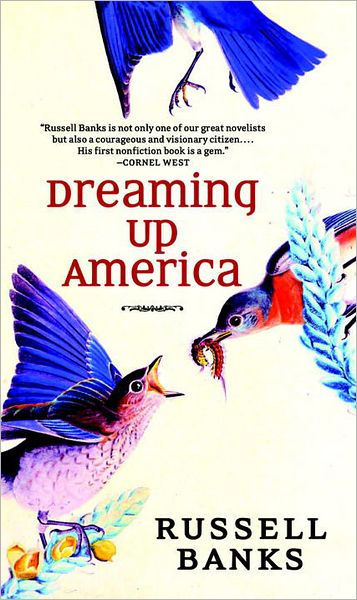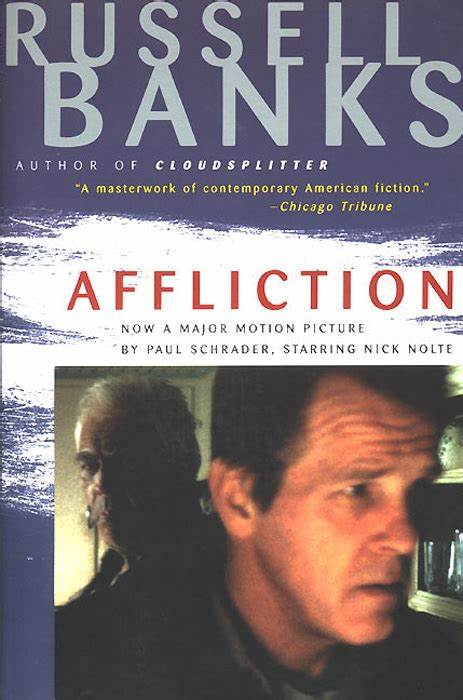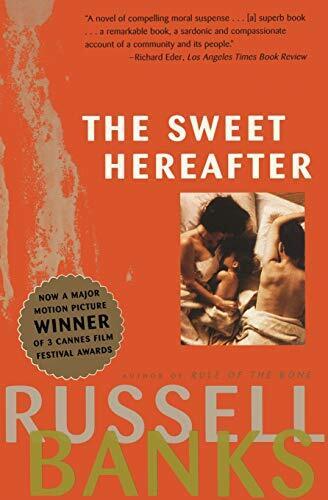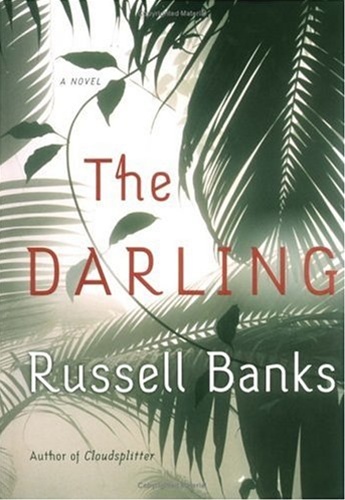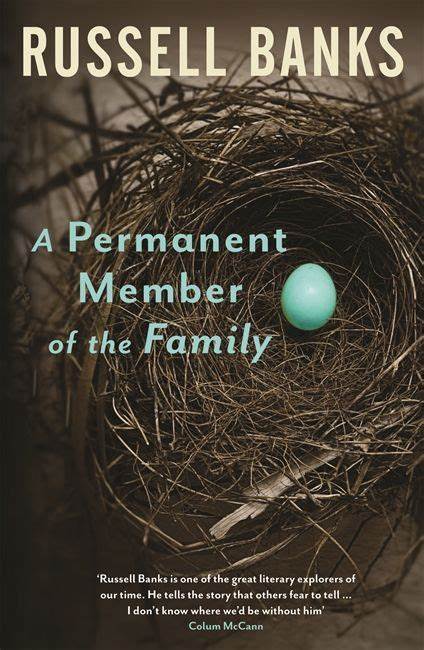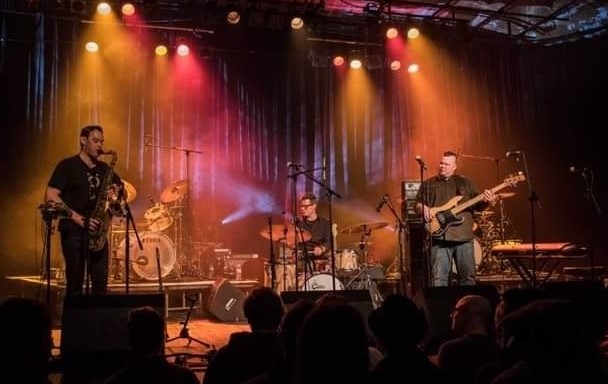
The Erotic Adventures of the Static Chicken, performing in Madison. isthmus.com
It was small and compact, but the first Riverwest Jazz Fest delivered a blow — a wake-up call — that should leave the city’s consciousness slightly dazed, and asking for more, if it has a cultural backbone.
Apologies if that lead exceeds an acceptable testosterone limit, but sometimes such associations seem more apt than others. Of course, it’s really too early to tell what sort of impact this event will have on the neighborhood or city, but you can begin to imagine by realizing that it was planned to be twice as big, and strives to be just that in the future.
As it was, the event, tucked neatly in a slightly two block-plus parameter of Center Street right off of Humboldt Blvd., allowed patrons easy access to all three bubbling venues: The Jazz Gallery Center for the Arts, Bar Centro, and Company Brewing. Plus, there was at least one band jamming in the storefront studios of Riverwest Radio, located between JGCA and Centro.
Talk about concentrated. Let’s say you couldn’t do much better even if you were a jazz-aholic who needs to down a row of hundred-proof musical shots.
Yes, I know, Wisconsin “has a drinking problem.” Maybe I’m better off retreating into comfy cliché-land for the faint-hearted. This was “the little fest that could.” *
Three other venues were all originally solicited to be pioneering fest participants. Each had some reason to decline.
Their loss, of course, but hopefully herein lies a lesson or two about smart marketing, especially in your own neighborhood, the lifeblood of such small venues. Each venue did have to pony up pay for the musicians, as the whole event was free admission, donations and tips aside. But that sort of commitment is the first step in smart collaborative marketing. An organized event like a jazz fest pretty much assures a built-in audience and revenue boost.
Although none of the crowds were literally shoulder-to-shoulder, everywhere on Center, people either milled and chilled in the Harvest Moon nocturne, or strolled to another venue.
Kudos to JGCA president Mark Lawson, reportedly whose brainchild this was. I suspect Lawson might’ve sensed this was an urgent moment to give the neighborhood a cultural jolt, as his space had foundered somewhat in terms of consistent recent musical activity. That’s hardly to diminish the place as a consistently and successfully operated art gallery.
And yet, as is fairly well known, the venue has a tremendous music legacy to maintain, that of the historic Milwaukee Jazz Gallery, whose inspired grotto of a ghost it inhabits.
The venue now has the cultural audacity to be a grants-dependent, community-oriented “arts center.” Though sans the original venue’s bar, it remains the sort of thing this neighborhood should embrace gladly. So, JGCA is an ever-colorful listening space, and still boasts the now-vintage checkerboard stage that hosted many famous jazz names in the Milwaukee Jazz Gallery days, and a respectable Yamaha baby grand house piano, and new sound system. The space’s success as a visual art gallery derives from the owning entity, the Riverwest Artists Association, strongly oriented to visual artists, and its president, Lawson, is a professional gallery curator.
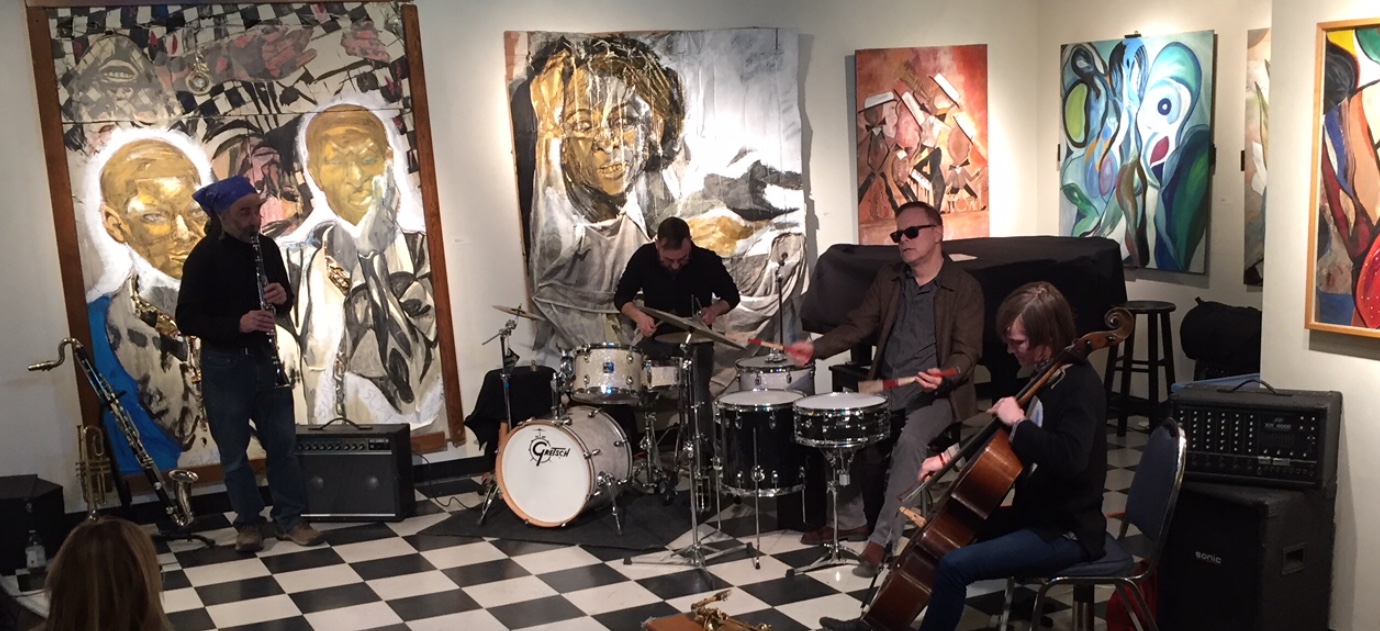
Drummer Victor DeLorenzo, formerly of The Violent Femmes and currently in the chamber rock duo Nineteen Thirteen, guest performs at the long-standing “Seeds Sounds” free jazz series at the Jazz Gallery Center for the Arts. riverwest.org.
His musical tastes lean toward more experimental and offbeat music than straight-ahead jazz, so “ya-never-know-what-you’re-gonna-get,” as a chocolate-loving pop philosopher once declared. Friday night strongly reinforced that reputation. The headline act proved as provocative and engrossing as its name, The Erotic Adventures of the Static Chicken (pictured at top) sports one of the most hilariously mock-bildungsroman monikers for a jazz band I’ve encountered.
The trio is led by ace and, yes, adventurous saxophonist Aaron Van Oudenallen (a.k.a. Aaron Gardner), who might be the second coming of electric-saxophone pioneer Eddie Harris; or what we hope Eddie would be doing today, if alive and pushing the hip envelope hard. Their set was a kaleidoscope of electronica, from slyly lyrical big-sky starbursts to Ab-Ex grunge, almost invariably underpinned by powerful currents of funk and driving rhythm. Van Oudenallen often plays with one hand twiddling an electronic effects box — as if an expose’ of the man behind the curtain, The Wizard of Odds.
Fender electric bassist Matt Turner regales the audience with his potent, pulsing virtuosity, and his eccentric affability. Drummer Jeremy Kunziar delivers multidirectional piston-like power.
This electronically deep-diving band has been around for a number of years and evidently has a decent (or indecent, as their name might suggest) following, at least slightly beneath “the lower frequencies,” where they speak to you, to paraphrase the great Invisible Man novelist Ralph Ellison.
The Chicken’s set included a boiling jam with trumpeter Jamie Breiwick sitting in, which climaxed with the band scorching Harris’s masterpiece “Freedom Jazz Dance,” a propulsive, shaman’s-shake of chord changes.
If you’re on Facebook, here’s a clip of The Chicken in full flight at the fest, during “Freedom,” courtesy of Tami Williams: https://www.facebook.com/fiilm/videos/3616003828679078
Meanwhile, over at the street’s straight-ahead jazz refuge, Bar Centro, a surprise waited in unknown-to-me bandleader and pianist Tael Estremera, He was possibly the youngest performer in the fest, yet also the most modern trad-oriented, as I heard them covering small masterpieces from John Coltrane’s classic album Giant Steps, including the title tune and the exquisitely modulated “Naima.” The quartet’s guitarist, Ben Dameron, whose own band Heirloom did the opening set, seems to be everywhere these days, and is a flash-firing virtuoso, slightly reminiscent of John McLaughlin. You should him check out ASAP.
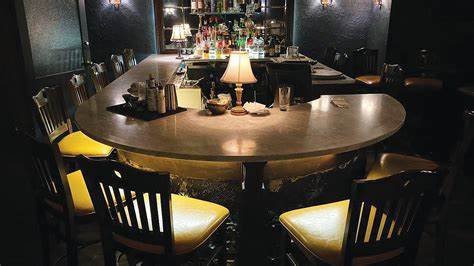
The stylishly curvaceous bar at Bar Centro is a strong feature of this fast-rising Riverwest jazz venue. visitmilwaukee.com.
Finally, a happy hubbub brimmed at a nearly packed house at Company Brewing. Trumpeter Eric Jacobson, best known for his bristling hard-bop, was delivering an appealingly relaxed set of modern jazz with a primo quartet of local vets, reflective of his excellent recent album Discover.
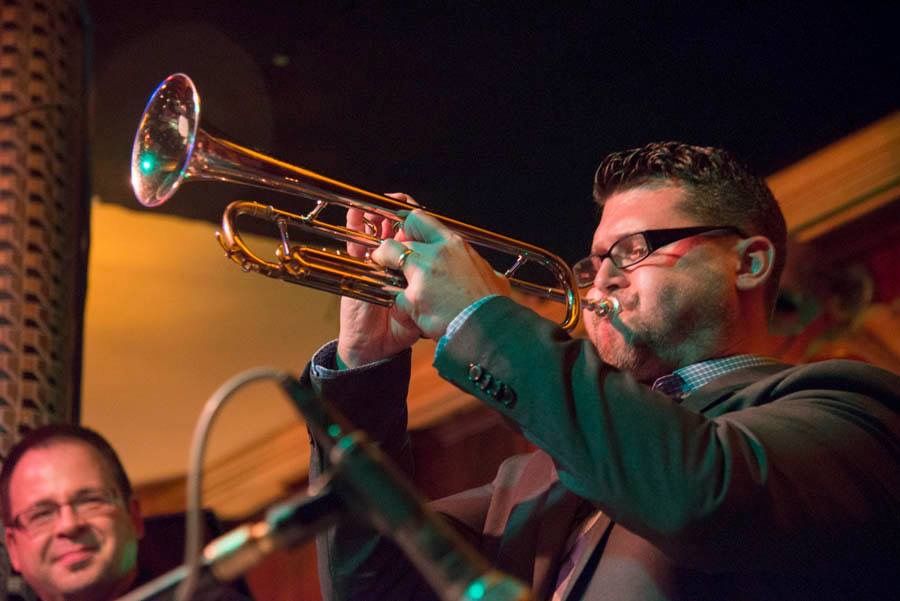
Jazz trumpeter Eric Jacobson. foxcitiesmagazine. com
Just about then, the festival’s headliner, double Grammy-winning trumpeter Brian Lynch, sauntered into Company and the table was set for the climax of the festival.
Alas, I had to depart just before Lynch’s set, but I have no doubt it was a compelling and bracing topper to an auspiciously-debuted event we hope becomes annual.
As for newborn Riverwest Jazz Fest, here’s a toast:
Let your garden grow,
in our pastures of cultural plenty,
as in, plenty mo’ music,
every which way you go.
________________
1. However, the arts center has consistently hosted a weekly “free jazz” workshop and, more recently, the Milwaukee Jazz Institute’s weekly educational jam sessions, and other community gatherings.
- who says Riverwesters don’t have a politically incorrect sense of humor? I just took this snapshot of by back-alley Riverwest neighbor’s handsome new wooden security fence with the following sign. (Apologies for my impertinence).



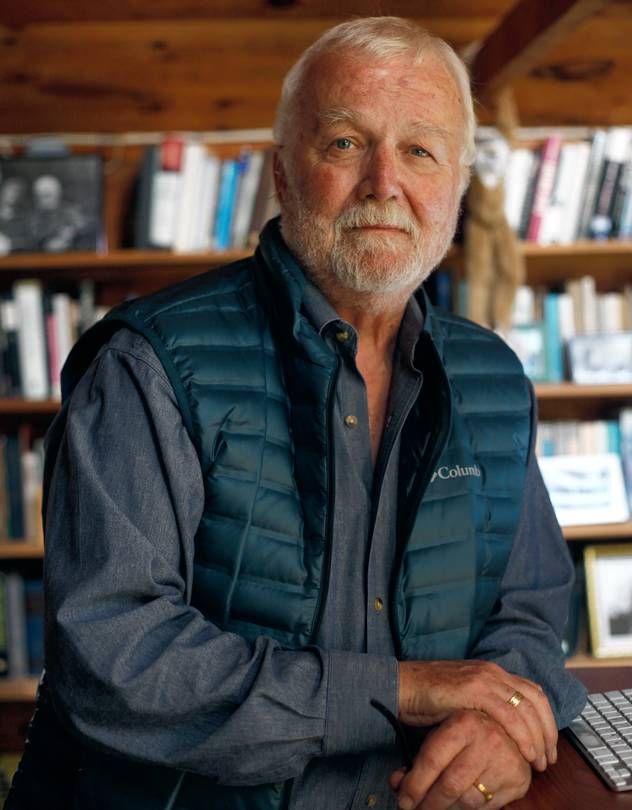 Russell Banks. Pinterest
Russell Banks. Pinterest